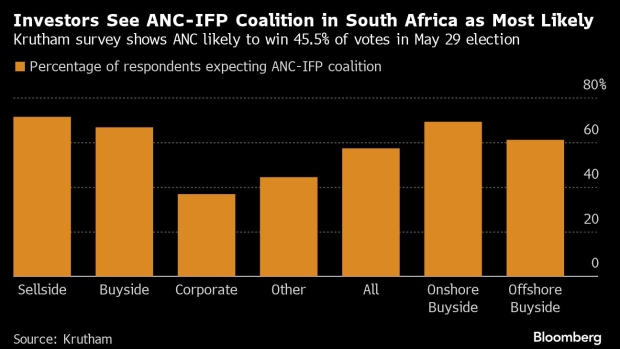South Africa investors see stable coalition after election
Most investors expect South Africa’s ruling African National Congress to form a stable coalition that includes the Inkatha Freedom Party after May 29 elections, boosting financial markets and ensuring policy stability, according to research group Krutham.
More than two-thirds of local and foreign fund managers and bankers, who made up the bulk of the 127 respondents to a Krutham survey, say the ANC is likely to take that option and wrap in other minor opponents if need be, rather than collaborate with its biggest rivals. Most of those investors expect such a coalition to last between two years and the full five years of the next government term.
An outcome of that nature would bolster investor confidence as the business-friendly IFP is seen as unlikely to demand major changes to economic policy instituted by the ANC under President Cyril Ramaphosa. Over recent weeks, incessant power cuts have receded and reforms that are being instituted have potential to boost private participation in everything from freight rail and ports to water provision as well as unblock a work permit impasse that’s locking crucial skills out of the economy.
Markets “are rightly starting to see the green shoots,” Peter Attard Montalto, Krutham’s managing director who co-wrote the report with analysts Nduduzo Langa and Thembi Baloyi, said in an interview on Thursday. “Negative coalition combinations are only a tail risk.”
South Africa’s rand has rallied 3.8% against the dollar over the last five weeks, the most of 16 major currencies tracked by Bloomberg, as polls have increasingly indicated that the ruling party will win enough of the vote to avoid coalitions with populist rivals. They include the Economic Freedom Fighters and the uMkhonto weSizwe Party, or MKP, a new party led by former President Jacob Zuma.
Overall, investors polled by Krutham expect the ANC to win about 45.5% of the vote, while earlier surveys by other companies predicted a share of as little as 37%. The Democratic Alliance, the biggest opposition party, was expected to garner between 20.9% and 22.3% support, the EFF between 9.7% and 10.7% and MKP 6.4%, Krutham said.
A survey of investors ahead of the 2019 election that was conducted by the group, then known as Intellidex, predicted that the ANC would win between 57.1% and 58.1% of the vote. It won 57.5%.
The leaders of the IFP and the DA, which are members of an 11-party opposition bloc, have both indicated that they will consider working with the ANC, although that isn’t their preferred option.










